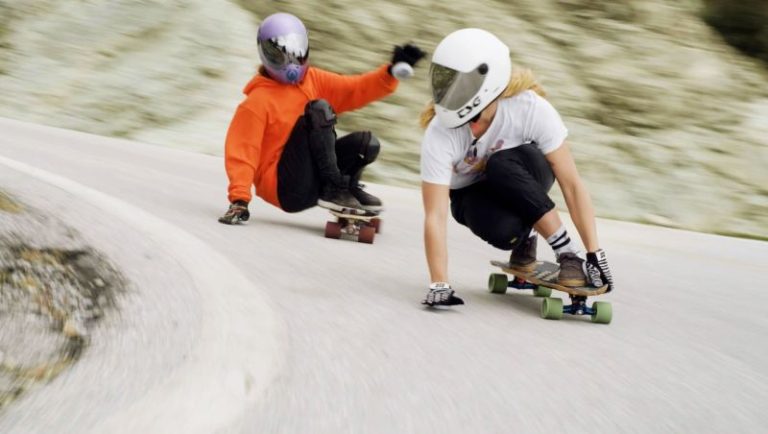On nothing but a “plank of wood and four wheels,” a group of women are careering down windy mountain roads at breakneck speed, constantly on the lookout for stones, turns and oncoming traffic.
For most people, this could sound less than relaxing – even terrifying. But for Anna Pixner, downhill skateboarding at speed evokes a different feeling: freedom.
Austrian Pixner has been riding concrete like surfers ride waves for six years. When she started competing, she would stand out in crowds of hundreds of men as one of a dozen women. Journalists and spectators are still quick to point out that she is an exception to the norm in the male-dominated world of downhill skateboarding, but Pixner has tired of such comments.
“When I started competing, I realized there are a lot more women out there that are into the same sport, but it was really hard to hear about them or see them because there is no media about it,” the 26-year-old adds.
That is about to change: Pixner’s journey is captured in a new film, “Woolf Women,” which documents the 2019 journey she and four other young women embarked on, taking them 5,700 kilometers (3,541 miles) from London, via Innsbruck, Austria, to the ancient Sumela monastery in the Pontic mountains of Turkey. The women embark on a pilgrimage of sorts, helping fellow rider Jenny Schauerte to come to terms to the sudden death of her father.
The documentary follows the group – German Schauerte, Belgian Jasmijn Hanegraef, Dutch Lisa Peters and Colombian Alejandra Gutierrez – as they navigate bureaucratic border crossings, nail-biting mountain paths and negotiate the ever-present dangers of their sport.
‘Confronting your weakest points’
One of the central themes of the film is mental health, exploring both Schauerte’s battle to process the sudden death of her father and also recovery from a devastating skating accident which left her needing multiple surgeries on her leg and almost took her away from the sport forever.
“In very intense moments, you’re confronting yourself with your weakest points. When you’re skating and you have to push your limits all the time, otherwise you don’t improve and you don’t have fun,” Pixner says.
“I think there’s some part in the sport that feels like a cure, it can also just be purely the adrenaline rush that gives you endorphins and just makes you feel happy physically in that moment. It helps people with depression because it … just gets your body in such a present state.
“If you’re going at that speed, you don’t have time to think about anything else and at that moment, you’re fully present in what’s coming up on the road. That’s all you see and all you are able to focus on. I think it helps us a lot to just be able to feel fully present in the moment, to practice that in whatever way and I think in a playful way, in the end.”
De Angelis says that she was attracted to the women’s story because even now, adventure stories with female protagonists aren’t as common as those featuring men.
“There are very few women adventure stories as a rule, men tend to be the ones that go out there as a pack and, you know, they grab it and then have great adventures. As women, we are slowly learning how to do that: we’re embracing it more and more,” she adds.
“There is not just this physical support for each other to make sure that they’re safe. There is this emotional support, a sort of spiritual support for each other, which I think is quite unusual.”
From the fringes to the mainstream
Once a sport firmly on the fringes of society, skateboarding is becoming more mainstream, and in 2021 became an Olympic event for the first time in the history of the Games.
Pixner is one of a growing number of people who hope that downhill skateboarding will soon become part of the Games’ roster.
“It is a very good spectator sport because it’s kind of like Formula One – in a way we are just racing each other,” she explains, adding that skaters employ similar strategies to car racers.
“Racing sports are always exciting to watch. If it’s a person on just a plank of wood with four wheels, and it’s fully just skill.
“I think it would contribute really well to the Olympics, especially now that skateboarding is already in there. It’s just another discipline… And I would love to see just all those opportunities for the next generation that I always dreamed of.”

